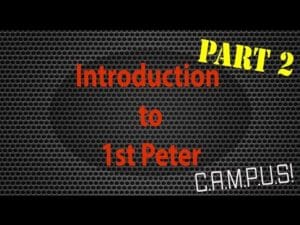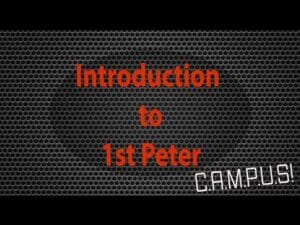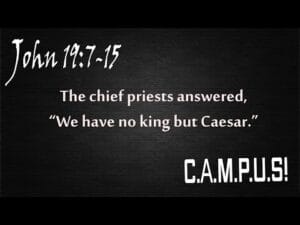
1 Peter Introduction Part 2 Bible Teaching
Shawn's teaching on 1 Peter 1:1-2 explores God's election based on foreknowledge, not merit, highlighting divine purpose, predestination, and believers' sanctification through Christ.

Shawn's teaching on 1 Peter 1:1-2 explores God's election based on foreknowledge, not merit, highlighting divine purpose, predestination, and believers' sanctification through Christ.

Jesus' resurrection brings peace, unity, and wholeness. His peace transcends worldly chaos, creating spiritual serenity. He breathes the Holy Spirit, empowering disciples. Thomas's faith highlights belief without seeing.

Shawn's teaching highlights disciples' disbelief in resurrection, Mary's encounter with Jesus, symbolic parallels with the Ark, and the shift from Sabbath to daily rest in Christ.

Peter's journey from impetuous fisherman to steadfast apostle highlights faith, divine guidance, and transformation. His epistles emphasize hope, unity with Paul's teachings.

Joseph of Arimathea and Nicodemus showed courage and respect for Jesus, emphasizing heart over wealth. The secured tomb and resurrection accounts highlight divine intervention, with Gospel variations underscoring authenticity.

Shawn's teaching on James 5:13-15 highlights varied faith expressions through prayer and praise, communal healing with elders, oil symbolism, and the power of confession and prayer.

James 5 teaches patience, prayer, and forgiveness, using Job and Jesus as examples. Emphasizes genuine communication, love, and service, avoiding hypocrisy and embracing trials.

Shawn's teaching covers Jesus' crucifixion, prophecy fulfillment, debates on crucifixion timing, theological implications, and emphasizes open-minded faith and prophecy accuracy.

James condemns the wealthy for indulgence, urges patience, warns of judgment, and emphasizes respect. Shawn and Paul echo themes of love, forgiveness, and readiness for Christ's return.

Shawn's teaching highlights "It is finished" as Jesus' mission completion, emphasizing salvation's fulfillment, freedom from the law, and living faith through grace and love.

James 5 critiques wealthy oppressors, urging patience for suffering Christians, emphasizes speech control, fair labor, and spiritual priorities over material wealth.

Shawn's teaching highlights Jesus' crucifixion, focusing on the seamless coat, prophetic fulfillment, and roles of Marys. It emphasizes Jesus as the ultimate High Priest and Messiah.

Shawn's teaching focuses on refraining from judgment, promoting kindness, humility, and reliance on God, aligning with biblical teachings on love and unity.

Jesus' crucifixion in John 19 highlights timing confusion, Simon of Cyrene's assistance, spiritual strength over physical, and salvation through faith, not works.

James teaches humility and reliance on God's grace to resist pride and temptation. Emphasizes spiritual discipline, genuine repentance, and aligning heart with God's word.

Shawn's teaching on John 19 highlights Pilate's struggle with Jesus' innocence, the Jewish leaders' pressure, divine authority over earthly rulers, and Jesus' ultimate kingship.

The teaching summary highlights Jesus' trial, Pilate's dilemma, spiritual growth through discipline, the significance of the number forty, and the symbolism of Jesus' suffering.

James teaches choosing divine over worldly wisdom; Shawn emphasizes spiritual over earthly adultery, aligning with God; both stress loyalty to God over worldly desires.

James 4:1 highlights conflicts from earthly desires, contrasting with peace from divine wisdom. Shawn stresses faith, pure motives in prayer, and reliance on God over self.

Jesus's kingdom is spiritual, not worldly. He embodies truth, contrasting human limitations. Shawn emphasizes truth's liberating power and highlights historical and modern injustices.